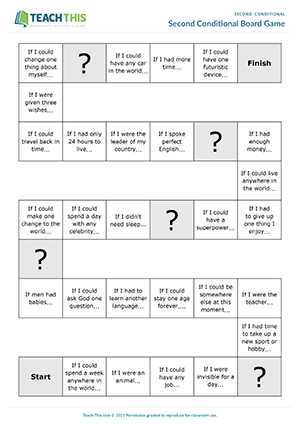If Conditionals Games


Imagined conditionsThere are different types of conditions. Some are possible or likely, others are unlikely, and others are impossible:If the weather improves, we’ll go for a walk.
(It is possible or likely that the weather will improve.)If the weather improved, we could go for a walk. (It is not likely that the weather will improve.)If the weather had improved, we could have gone for a walk. (The weather did not improve – fine weather is therefore an impossible condition.)These types of conditions are used in three types of sentences, called first, second and third conditional sentences. Imagined conditions: the third conditionalWe use the third conditional when we imagine a different past, where something did or did not happen, and we imagine a different result:If I had played better, I would have won.
(I didn’t play well and I didn’t win.)It would have been easier if George had brought his own car. (George didn’t bring his own car, so the situation was difficult.)If the dog hadn’t barked, we wouldn’t have known there was someone in the garden. (The dog barked, so we knew there was someone in the garden.). Real conditionalsSome conditions seem more real to us than others. Real conditionals refer to things that are true, that have happened, or are very likely to happen:If you park here, they clamp your wheels. (It is always true that they clamp your wheels if, or every time, you park here.)If I can’t sleep, I listen to the radio.
(it is often true that I can’t sleep, so I listen to the radio)In real conditional sentences, we can use the present simple or present continuous in both clauses for present situations, and the past simple or past continuous in both clauses for past situations. We can use these in various different combinations. Conditional clauses with will or wouldWill and would can be used in conditional clauses, either with the meaning of ‘being willing to do something’, or to refer to later results:If Clare will meet us at the airport, it will save us a lot of time. (if Clare is willing to meet us)If you would all stop shouting, I will try and explain the situation!If it will make you happy, I’ll stay at home tonight. (If it is true that you will be happy as a result, I’ll stay at home tonight.)We sometimes stress the will or would, especially if we doubt that the result will be the one mentioned:If it really would save the planet, I’d stop using my car tomorrow. (If it really is true that the planet would be saved as a result, I would stop using my car, but I doubt it is true.).
Esl Conditionals
Conditional Sentences are also known as Conditional Clauses or If Clauses. They are used to express that the action in the main clause (without if) can only take place if a certain condition (in the clause with if) is fulfilled. There are three types of Conditional Sentences.
It should be the second tag within the tag. Aiml tools. If a user enters Hello Alice, hello alice, HELLO ALICE etc., all inputs are valid and bot will match them against HELLO ALICE. HELLO ALICE Hello UserHere, the template is 'Hello User' and represents a robot's response to user input. Tag tag represents the bot's response to the user.